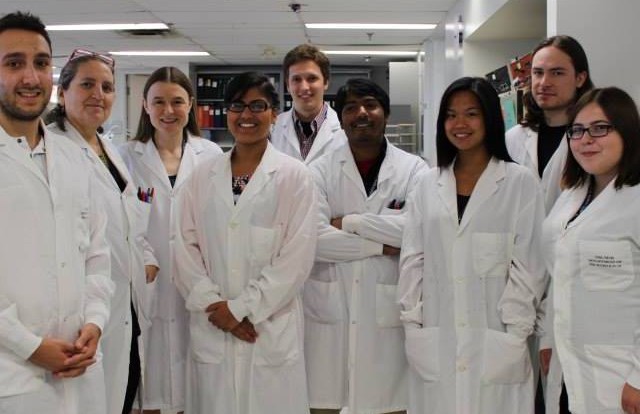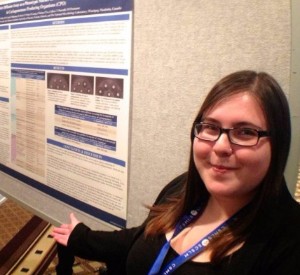As part of a research project at Mount Sinai Hospital in Toronto, one Michener student explored new methods for detecting the super-bugs that pose serious risks to public health.
Danielle Nicole Grohn was part of a bacteriology research team that investigated a cost-effective method of screening for carbapenemase-producing organisms (CPOs), a family of highly resistant bacteria that can cause serious infections including sepsis, pneumonia, wound infections and urinary tract infections.
“Infections caused by these organisms are very difficult to treat,” says Nicole. “There is an increased demand for simple and cost effective methods that allow for accurate detection and classification.”

“The evolution of antibiotic resistance and the spread of resistant microbes around the globe is one of the most serious issues facing modern health care. This research addresses the crucial topic of resistance to one of the last resort groups of antibiotics usually reserved to try to control infections that have not been stopped by other antibiotics.”
“The spread of antibiotic resistance is a major threat to our health care system as well as global public health,” she adds.
CPOs are spreading globally with a small number of cases positively identified in Canada. Rapid and accurate laboratory screening is needed to contain any potential outbreaks.
“It is essential to be able to detect bacteria resistant to this type of agent as quickly as possible as the first step in trying to limit their ability to spread through the population,” says Dr. Peter Bridge, Chair of the medical laboratory sciences programs at Michener. “The evolution of antibiotic resistance and the spread of resistant microbes around the globe is one of the most serious issues facing modern health care. This research addresses the crucial topic of resistance to one of the last resort groups of antibiotics usually reserved to try to control infections that have not been stopped by other antibiotics.”
The research team investigated a diagnostic kit called the ROSCO KPC/MBL + OXA-48 Confirm Kit, which includes various tablets that allow for the detection of different classes of carbapenemases. They were able to demonstrate that a simple temocillin tablet diffusion assay can be used to effectively screen for class D carbapenemases, a class of carbapenemases that are weaker and more difficult to detect. Resistance to temocillin, a variant of penicillin, is a reliable method to detect class D carbapenemases and is the only phenotypic marker that has been discovered for this purpose.
“The temocillin tablet diffusion assay is a cheap and very simple method for screening for class D carbapenemases, which makes the assay very feasible to implement at many microbiology laboratories,” says Nicole.
“The research she did was very useful because it focused on one particular area of carbapenemase producers that laboratories need to detect,” explains Barbara Willey, Nicole’s supervisor at Mount Sinai Hospital. “They’re difficult to detect, problematic and very difficult to treat. This is going to make a huge difference when implemented in various laboratories.”
 With the help of a professional development grant from The Michener Institute, Nicole brought her research to the Canadian Society for Medical Laboratory Science (CSMLS) national LabCon conference in Montreal in May. There, she had the opportunity to share the research findings with other individuals in the medical laboratory science community.
With the help of a professional development grant from The Michener Institute, Nicole brought her research to the Canadian Society for Medical Laboratory Science (CSMLS) national LabCon conference in Montreal in May. There, she had the opportunity to share the research findings with other individuals in the medical laboratory science community.
“It is very exciting when students from Michener have the opportunity to participate in research projects at clinical sites and, in this case, when they’re also able to present the findings at a national conference,” says Dr. Bridge.
Nicole recently received a volunteer recognition award from Mount Sinai Hospital for her volunteer work and contribution to this research project. She continues to volunteer in the Rapid Response Laboratory at Mount Sinai Hospital. She is also looking forward to being involved with new microbiology research projects at Mount Sinai Hospital again this summer.


